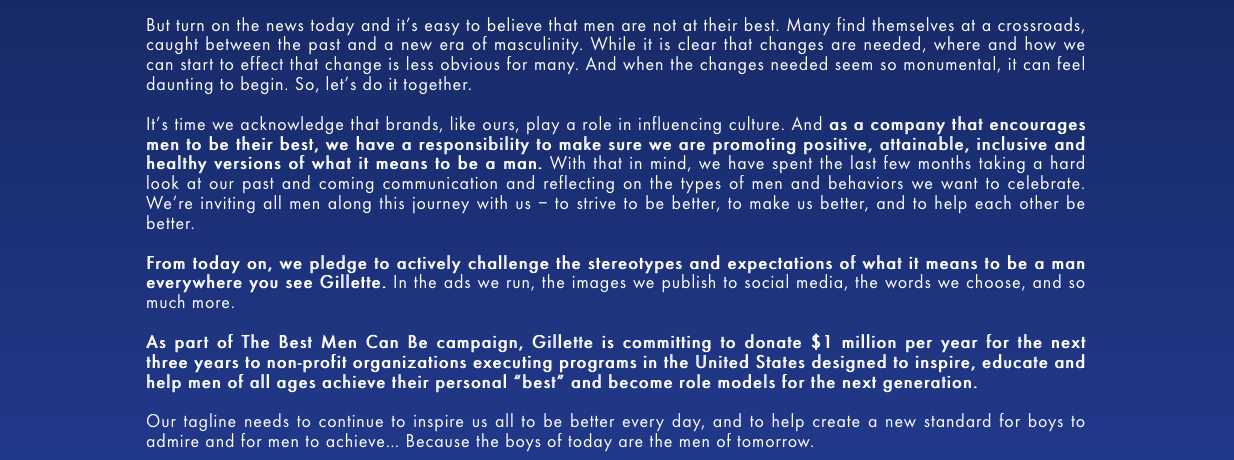
What Defines The Best a Brand Can Be?
After reading the protest and praise for the new Gillette ad that calls men to “be the best that you can be,” are you going to boycott Gillette?
I hope you’re not looking for a happy-talk response here. Despite marketers having undue and over-reaching influence on culture and your worldview, you deserve better. If you’re a consumer, you’re a brand owner. Don’t let brand marketers define who you are or what to believe.
At face value, the short film, called “We Believe,” is a lightweight take on bullying, the #metoo movement, and what Gillette considers “toxic masculinity.” Can a brand address these issues in a meaningful way in 90 seconds?
Is Gillette a brand that thinks it can help usher in a “new era of masculinity?”
Why has it taken Proctor & Gamble 30 years to realize that brands play a role in influencing culture? Why should they have to ask if they should pull their advertising from networks after receiving criticism. Where's the soul of this company?
Do we need the brands that represent the products we buy defining what it means to be a man or the character values we believe in?
Perhaps this ad isn’t as much of a manifesto as it is a confession for the way in which the company has represented itself and contributed to the culture’s current state of “toxic masculinity” and the #metoo movement:
- Writer Bertie Brandes calls out Gillette for objectifying women in a 2013 ad that asks, “What Do Women Want?”
- Gillette tops the list of sexist ads in this article at The Vintage News.
- The Radiance Foundation highlights the disturbing facts (#facktivism) of P&G’s support for “toxic feminism,” it’s advertising on networks that promote the issues they now stand against, and its own bias in promoting anti-bias.
Companies and Brands Must Stand for Something
Aren’t all branding and marketing efforts designed to drive sales in some way? Of course — Gillette is trying to add meaning and recapture market share from the industry disrupters — Harry’s and Dollar Shave Club.
Gillette is taking a stand for something, with a call to the public to hold Proctor and Gamble, their brands, and messaging accountable. They aspire to be true to “a set of defined standards meant to ensure we fully reflect the ideals of Respect, Accountability and Role Modeling in the ads we run, the images we publish to social media, the words we choose, and more.”
Good for them, but will it work? John Sexton states on HotAir.com,
“Woke is becoming just another signifier for a premium brand, and that means a tiresome future full of ads like this one.”
Where is the consistency? Is this a new leaf for Proctor & Gamble, or continued efforts to align its brands with a social trend?
The Radiance Foundation’s response is precise:
“So, Gillette, #TheBestMenCanBe is far beyond your political hashtag. Can some men do better? Absolutely. Can some women do better? Absolutely. There are many men who protect the vulnerable, who teach their children that bullying is for the weak, who treat women with respect, who impart integrity and spiritual character, and don’t fit the stereotype you’re foisting onto all men. There are things more toxic than (leftist) societal perceptions of acceptable “masculinity”. And we see it in the nearly 1 million killed a year by an industry supported by your donations. Or, does that truth cut like a razor?”
One short film will not make a brand believable or authentic. Virtue signaling is not a sustainable brand building strategy.
Values-driven brands need to demonstrate consistency in character and behavior over the long term.
Every time you interact with a brand and its touch points, you tell herself a story about what you believe the brand stands for — the brand's purpose, values, beliefs, character, and worldview.
If what you perceive is not authentic and consistent, you're less likely to accept the organization or brand as believable.
We may never know what prompted Gillette’s desire for self-reflection and commitment to choose their words well. It’s never too late to learn that positive words influence and inspire people to trust, follow, take action, and make a difference.
Do I believe Gillette is sincere? Not until I experience a consistent pattern of character and behavior in action.
Will Gillette inspire me to be a better man? No — I’m not going to base my character on market-driven brand characteristics and social trends. There’s a deeper path to understanding what it means to be the best you can be, and it doesn’t have anything to do with branding.
We can all do better with how we treat people with respect, dignity, and compassion. Our companies and brands should be a reflection of who we are and what we deeply believe.
Regardless, I still need to shave. In light of the facts about P&G, I will reconsider my choices, as all consumers have the right to do.
+++++++
Read more about brand perception on the Aespire Clarity Blog. Discover twelve principles for purpose-driven brands and culture through the Clarity Credo. If your faith drives your work, then you should take the deep dive at EntreWorship.
